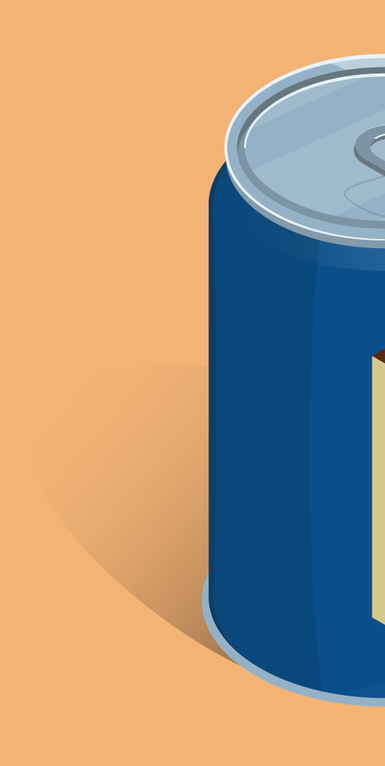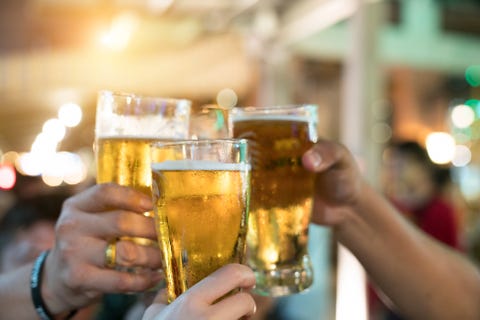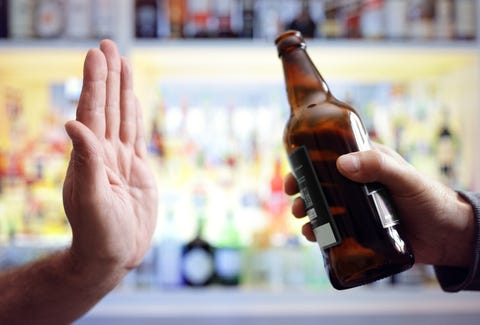

Every January, people attempt New Year’s resolutions to beome a healthier, new version of themselves. These goals usually revolve around eating healthier or hitting the gym. In fact, a YouGov poll from January 2018 revealed that eating healthier, working out and saving money were the three most popular resolutions for the year.
But recently, giving up alcohol in the name of “Dry January” has become trendy. If you haven’t already heard of the popular resolution, here’s the lowdown on what that entails.
What is Dry January?
Created by UK-based nonprofit Alcohol Research UK, the first official “Dry January” began in 2013. That year, more than 4,300 people pledged not to drink any alcohol for the month of January. And yes, “dry” means abstaining from alcohol for a month without any cheat days.
In 2017, over 5 million Brits pledged to live booze-free for the campaign, which has quickly become trendy in the United States. Apart from better sleep and increased energy — well-documented benefits of forgoing alcohol — proponents claim that dumping booze for one month can reverse the negative health impacts of regular drinking, like fatty liver disease and elevated blood sugar.
Great! So a 4-week abstinence stint can wash away years of binge drinking and a daily Bud habit, right? Well, not exactly. Read on to find out what downing too much booze does to your body—and whether or not Dry January is really worth it.

Getty ImagesWitthaya Prasongsin
First, Here’s How Alcohol Affects Your Body
Your body breaks booze down in multiple spots, including your stomach and pancreas, but your liver bears the burden of turning alcohol into less damaging forms. In that process, toxic byproducts lead to inflammation in your pancreas, which could potentially harm your insulin-producing cells and impair your fat metabolism. This could lead to fatty liver, a silent disease that’s relatively benign in its early stages. (Your liver isn’t the only thing at risk: drinking too much can damage your entire body, including your heart, skin, penis, and muscles.)
Even though fatty liver is common in those that drink at or above the guidelines (“moderate” is defined as no more than two drinks per day for men), there is evidence that it’s reversible when you abstain from alcohol or even drink less, says Rotonya Carr, M.D., hepatologist at the Hospital of the University of Pennsylvania.
With continued drinking, about a third of people with fatty liver go on to develop alcoholic hepatitis, or inflammation of the liver, which eventually leads to scarring and the life-threatening condition of cirrhosis in 10 to 20 percent of patients. Even in these advanced stages, research suggests that giving up alcohol can reverse scarring and improve the chance of survival.
“The liver is a very forgiving organ,” adds Dr. Carr, “it can heal itself when the insult, in this case alcohol, goes away.”

Getty ImagesBrianAJackson
So, Can Giving Up Alcohol For a Month Reverse the Damage?
The catch: It’s going to take more than one month to completely heal your liver and the rest of your body, points out Aaron White, Ph.D., senior scientist at the National Institute of Alcohol Abuse and Alcoholism. “But taking a month off from drinking is never a bad idea, and is a great time to evaluate your relationship with alcohol,” says White.
Going Alcohol-Free May Improve Sleep Quality
Anecdotally, people often credit alcohol with helping them sleep. However, a review of studies in 2013 found that alcohol may help people fall asleep quicker and sleep more deeply during the initial stages of sleep, but is likely to disrupt sleep later in the night.
“Alcohol on the whole is not useful for improving a whole night’s sleep. Sleep may be deeper to start with, but then becomes disrupted,” study co-author Chris Idzikowski, PhD, and sleep specialist, said in a statement. “Additionally, that deeper sleep will probably promote snoring and poorer breathing. So, one shouldn’t expect better sleep with alcohol.”
Dry January Can Help You Drink Less
We don’t often realize how much we drink, or, say, how much we depend on a nightly beer or weekend bender to relax. While drinking in moderation isn’t all bad — and is, in fact, associated with a reduced risk of heart disease and death — taking time off may help you drink less the rest of the year. In fact, research suggests it will positively impact your drinking choices following the challenge.
A 2016 study of adults who did a “Dry January” — meaning they stopped drinking booze entirely for the first month of the new year — found that up to six months later, they were drinking on fewer occasions and drank less when they did imbibe. (Now, you might prefer the moderation route if going cold turkey sounds too restrictive.
Case in point: Pat Heine, a 29-year-old trail runner, cut out booze in January 2017 to prepare for the 106-mile Ultra-Trail du Mont Blanc. “I’d seen other runners quit drinking as a way to focus for big races,” says Heine.
More than a year later, he’s still dry. “I was feeling better physically and mentally.”
One word of caution, though. If you are a chronic heavy drinker going cold turkey, pay attention for symptoms like insomnia, agitation, sweating, and anxiety. This could signal withdrawal, a potentially life-threatening situation that needs medical supervision. In that case, it’s best to talk to your doc first.
You may have a drinking problem if routinely you black out or if friends have expressed concern about how much alcohol you consume. For guys, binge drinking typically means partaking in five or more drinks in the span of about two hours. According to the United States dietary guidelines, men should drink no more than two alcoholic drinks per day. A single drink is roughly a 12-ounce beer, 5-ounce glass of wine or 1.5-ounce shot of liquor.
Source: Read Full Article